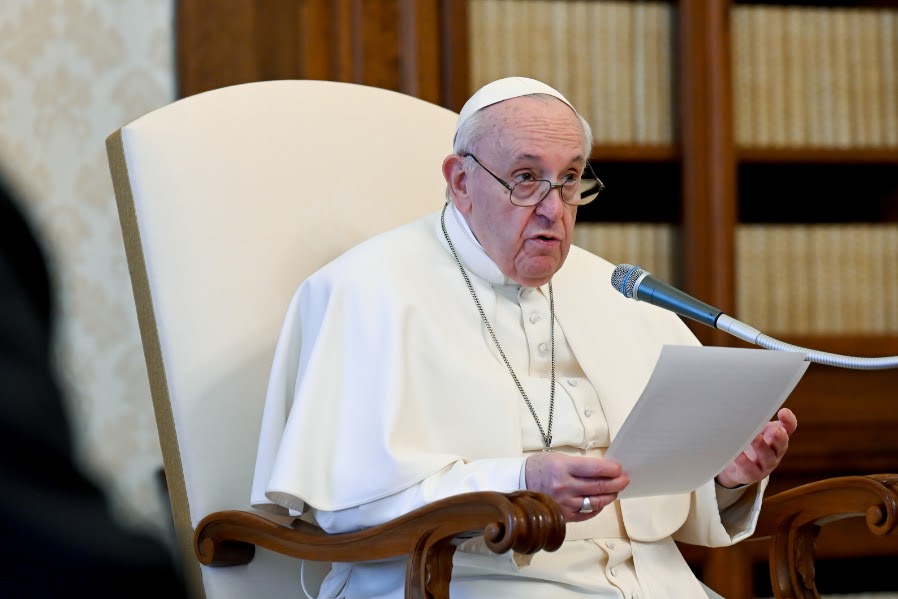Pope Francis delivers a general audience address in the library of the Apostolic Palace. / Vatican Media
Pope Francis today urged Catholics worldwide to keep praying for “our sorely tried brothers and sisters” in Iraq.
Speaking at his general audience this morning the pope reflected on his historic three-day visit to the Middle Eastern country.
Noting that Iraqis were rebuilding towns and cities destroyed under Islamic State occupation, he said: “The Muslims are inviting the Christians to return and together they are restoring churches and mosques. And, please, let us continue to pray for these, our sorely tried brothers and sisters, so they might have the strength to start over.”
The pope dedicated Wednesday’s general audience to the Iraq trip, pausing his long-running cycle of catechesis on prayer.
He said that by visiting Iraq, he had fulfilled a dream of his predecessor Pope John Paul II, who had hoped to mark the turn of the millennium with a journey “in the footsteps of Abraham,” but was unable to travel to the ancient city of Ur.
“Never before has a pope been in the land of Abraham. Providence willed that this should happen now, as a sign of hope, after years of war and terrorism, and during a severe pandemic,” he said.
“After this visit, my soul is filled with gratitude — gratitude to God and to all those who made it possible.”
He described his landmark encounter with Iraq’s leading Shiite cleric, Grand Ayatollah Ali al-Sistani, as an “unforgettable meeting.”
He continued: “I strongly felt a penitential sense regarding this pilgrimage: I could not draw near to that tortured people, to that martyr-Church, without taking upon myself, in the name of the Catholic Church, the cross they have been carrying for years; a huge cross, like the one placed at the entrance of Qaraqosh.”
“I felt it particularly seeing the wounds still open from the destruction, and even more so when meeting and hearing the testimony of those who survived the violence, persecution, exile…”
But he also saw joy and hope during his whirlwind trip, in which he travelled more than 900 miles within Iraq.
“I sensed it in the many greetings and testimonies, in the songs and gestures of the people. I read it on the luminous faces of the young people and in the vivacious eyes of the elderly,” he commented.
“People stood waiting for the Pope for five hours, even women with children in their arms. They waited and there was hope in their eyes.”
He added: “The Iraqi people have the right to live in peace; they have the right to rediscover the dignity that belongs to them.”
The pope lamented that war had devastated the historic city of Baghdad, which once housed one of the world’s great libraries.
He said: “War is always that monster that transforms itself with the change of epochs and continues to devour humanity. But the response to war is not another war; the response to weapons is not other weapons.”
“And I asked myself: who was selling the weapons to the terrorists? Who sells weapons today to the terrorists — which are causing massacres in other areas, let’s think of Africa, for example? It is a question that I would like someone to answer.”
He said that the challenge for Iraq — and other war-torn countries — was to build fraternity.
“For this reason, we met and we prayed with Christians and Muslims, with representatives of other religions, in Ur, where Abraham received God’s call about 4,00 years ago,” he said.
The message of fraternity also resounded during his visit to the Syriac Catholic cathedral in Baghdad, where 48 people were slaughtered during a terrorist attack in 2010.
“The Church in Iraq is a martyr-Church. And in that church that bears an inscription in stone the memory of those martyrs, joy resounded in that encounter. My amazement at being in their midst mingled with their joy at having the pope among them,” he said.
Pope Francis noted that he also took his appeal for fraternity to northern Iraq, to Mosul and Bakhdida (also known as Qaraqosh).
“The ISIS occupation caused thousands and thousands of inhabitants to flee, among them many Christians of a variety of confessions and other persecuted minorities, especially the Yazidi,” he said.
Addressing Iraqis who fled the country, he said: “You have left everything, like Abraham; like him, keep the faith and hope. Be weavers of friendship and of fraternity wherever you are. And if you can, return.”
He said that the message of fraternity was also evident in the trip’s two public Masses, in Baghdad and Erbil.
“Dear brothers and sisters,” he concluded, “let us praise God for this historic Visit and let us continue to pray for that land and for the Middle East.”
“In Iraq, despite the roar of destruction and weapons, the palm, a symbol of the country and of its hope, has continued to grow and bear fruit.”
“So it is for fraternity: like the fruit of the palm, it does not make noise, but the palm is fruitful and grows. May God, who is peace, grant a future of fraternity to Iraq, the Middle East and the entire world!”
Source: CNA

